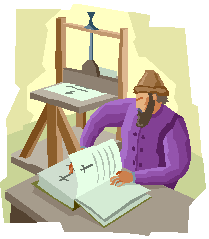Links
| Biographical/Historical |
| Feminist |
| New |
| Psychological |
| Reader-Response |
| Site Map |
|
Biographical/Historical |
 |
Biographical/Historical criticism focuses on the biographical and historical elements outside of a text. These elements give the reader a sense of what the author was like as a person and what type of life they led during a certain time period.
| ►What
does historical/biographical criticism focus on? ►Application Example ►For Further Exploration... |
Historical elements will help you to interpret a
text by reconstructing the past, or the context of a work.
Historical Criticism considers
|
Studying these histories will allow you to understand the authorís time and then relate it to your response to text. You can make direct connections between authors and their texts by thinking about the authorís history and the historical events that may have affected their work.
To analyze a text with biographical and historical
criticism, follow these steps.
|
-
Application Example
If you were to apply biographical and historical criticism to Hamlet you could research the late 1500's and early 1600's, which is the time period that Shakespeare lived and wrote in. You could consider the politics, religion, social customs, and literature of that time and relate those historical elements to characters, scenes, or settings in Hamlet.
-
Skylar Hamilton Burris provides a definition, overview, and critical papers concerning historical/biographical criticism on his website.
-
This website discusses the different areas of historical criticism.
Kelly Stevens, 20 April 2004